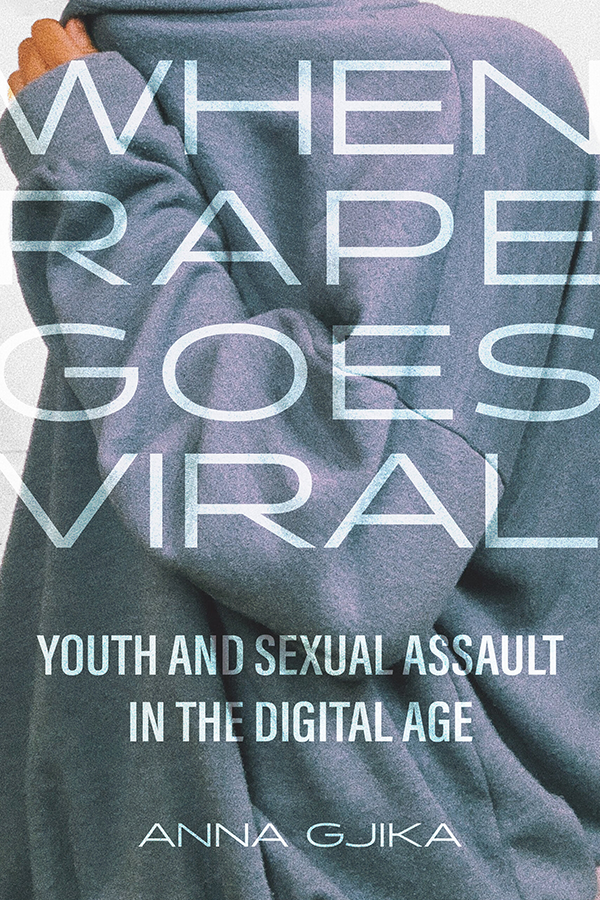
‘When Rape Goes Viral’ looks at why cases like Steubenville happen
March 6, 2024, 9:51 am CST
- !function(d,s,id){var js,fjs=d.getElementsByTagName(s)[0],p=/^http:/.test(d.location)?'http':'https';if(!d.getElementById(id)){js=d.createElement(s);js.id=id;js.src=p+'://platform.twitter.com/widgets.js';fjs.parentNode.insertBefore(js,fjs);}}(document, 'script', 'twitter-wjs'); Tweet
- lang: en_US
-


Three high-profile cases of sexual assault in 2012 followed a basic pattern: A teenage girl was sexually assaulted at a house party by one or more teenage boys while she was incapacitated by alcohol. The attacks were recorded, and the photos, videos and stories were shared on social media or via texts. The photos and videos were used to ridicule the victims among their peers. Those texts and posts later became evidence in criminal cases.
These incidents took place in Steubenville, Ohio; Maryville, Missouri; and Saratoga, California, and sparked national conversations about youths, technology and sexual assault in 2013.
“The question gnawing at everyone, myself included, was: What were these kids thinking?” writes Anna Gjika, a sociology professor who studies crime and gender issues.
More than 10 years later, Gjika has attempted to answer that question in her new book, When Rape Goes Viral: Youth and Sexual Assault in the Digital Age. She took a close look at the three attacks in 2012 but identifies a number of similar instances that have happened more recently.
One of the elements that the public found shocking about the cases was how many bystanders filmed or photographed the unconscious girls or the sexual assaults as they were occurring, without intervening.
In talking to people involved in the cases and to teens in general as part of her research, Gjika found that the young people did not think of their social media as archival so much as “of the moment.” They filmed and posted what was happening around themselves because they were used to doing that.
“Sharing an experience has become an integral part of the experience,” Gjika writes.
In this episode of The Modern Law Library podcast, Gjika and the ABA Journal’s Lee Rawles discuss her research into generational attitudes toward social media and sexual assault, the promises and pitfalls of digital evidence in sexual assault cases, how social media can be empowering or degrading for survivors, the social responsibility held by the legal community and the tech industry, and what interventions could be effective to prevent such assaults from taking place.
Digital evidence, such as cellphone videos and texts, can be extremely beneficial to prosecutors looking to prove incidents of sexual assault, particularly when victims are unable to recount their experience because they were unconscious or impaired during the attacks.
But Gjika explains that this kind of evidence is not uncomplicated. The way that juries perceive the evidence will still be filtered through societal expectations and prejudices. Defense attorneys do not have the same access to digital evidence from tech companies and usually lack capacity to process immense amounts of data.
The expertise, willingness and resources of police departments and prosecutors’ offices to seek out this evidence also vary widely. And the victims can be further traumatized by the use in court of images and video of their assaults and the knowledge that the images continue to be disseminated on the internet.
In closing, Rawles and Gjika discuss what actions can be taken by schools, the legal community and the tech industry to prevent such attacks or to assist victims whose assaults have been digitally documented. Gjika thinks that educational programs and trainings for teens have to focus on peer groups and norms, rather than emphasizing individual responsibility, and “must be grounded within adolescents’ lived experiences, rather than on adult fears and anxieties.”
She also argues that adults, as well as teens, would benefit from “ethical digital citizenship initiatives,” where concepts such as privacy and online decision-making could be discussed. And she suggests the creation of government-funded organizations to assist survivors with removing digital content from the internet.
Want to listen on the go? The Modern Law Library is available on several podcast listening services. Subscribe and never miss an episode. Apple | Spotify | Google Play(adsbygoogle = window.adsbygoogle || []).push({});
// In This Podcast:
Anna Gjika
Anna Gjika is an assistant professor of sociology at the State University of New York at New Paltz, where she teaches undergraduate courses on crime and society, the sociology of violence, and gender and crime. Her research explores the intersections of gendered violence and technology. She is the author of When Rape Goes Viral: Youth and Sexual Assault in the Digital Age.
Related topics: Criminal Justice | Prosecutors | Trials & Litigation | Internet Law | Technology | Evidence | Juries | ABA Journal Podcast | Privacy Law | The Modern Law Library | Public Interest You might also like:- Group representing immigration judges told to get approval before speaking publicly
- Lawyer accused of spying on Muslim colleagues gives up law license
- Appeals court blocks Florida 'Stop Woke Act,' says it's a 'First Amendment sin'
- Did 'grand bargain' fail to materialize in Trump ballot case? Metadata leads to speculation
- Supreme Court keeps Texas migrant law on hold until at least March 13
Introducing Jobbguru: Your Gateway to Career Success
The ultimate job platform is designed to connect job seekers with their dream career opportunities. Whether you're a recent graduate, a seasoned professional, or someone seeking a career change, Jobbguru provides you with the tools and resources to navigate the job market with ease.
Take the next step in your career with Jobbguru:
Don't let the perfect job opportunity pass you by. Join Jobbguru today and unlock a world of career possibilities. Start your journey towards professional success and discover your dream job with Jobbguru.
Originally posted on: https://www.abajournal.com/books/article/podcast-episode-214/?utm_source=feeds&utm_medium=rss&utm_campaign=site_rss_feeds